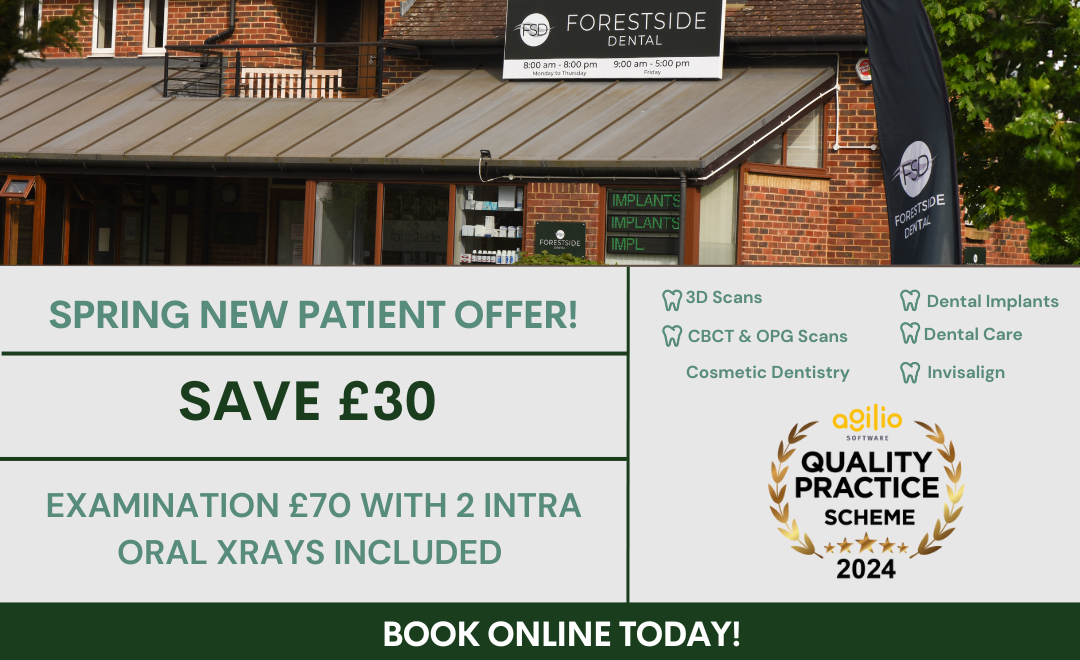Good oral hygiene is not only important for the appearance of your teeth, it is also an essential part of looking after your overall physical health. Endocarditis is a rare but serious infection impacting the inner lining of the heart, and dental issues can cause it. It may seem surprising, but this sometimes fatal condition can be caused by bacteria from the mouth entering the bloodstream and causing inflammation in the heart. Endocarditis is rare, but the Forestside Dental team are here to provide expert advice on how you can prevent this serious infection.
What is Endocarditis?
Endocarditis is the medical term given to inflammation of the inside lining of the heart. Caused by bacterial or fungal infections, endocarditis impacts the heart chambers and valves and is caused by germs entering the bloodstream.
There are many reasons why a person may develop endocarditis, including:
- Heart valve surgery
- Existing heart conditions
- Heart birth defects
- IV drug use (long term/addictions)
- Dental treatment
- Untreated gum disease
While Endocarditis can be caused by a fungal infection (candida), it most commonly occurs due to bacteria entering the bloodstream. An endocarditis diagnosis after dental treatment is extremely rare, and it is important to know that any procedure involving placing tubes or other medical instruments into the body comes with a risk of infection.

Endocarditis & Gum Disease
As dentists, we care about the health of our clients and want everyone to have the healthiest teeth and gums possible. A poor oral hygiene routine can lead to tooth pain, decay, tooth loss and, in extreme cases, serious illnesses like endocarditis.
People suffering from gum disease have a higher risk of developing bacterial infections inside the mouth, potentially spreading to the bloodstream and then the heart - but how exactly does gum disease lead to endocarditis?
Bacteria are found in tooth plaque, and when this is left to grow, gingivitis can occur and cause gums to bleed and deteriorate over time. Blood when you brush your teeth should never be ignored; it is a sign that something isn’t right and you may have infected gums. Swollen, inflamed and bleeding gums are the perfect environment for bacteria to thrive and enter the bloodstream.
Once the bacteria enter the bloodstream, a more serious infection may be just around the corner. If the bacteria reaches the heart lining, the germs can stick to the surface of the valves and chambers and cause serious health concerns. While a bacterial infection like this is rare, it is still possible and is the reason why we can’t stress this enough - never ignore bleeding gums!
Symptoms of Endocarditis
According to the British Heart Foundation, endocarditis affects one in 30,000 people every year in the UK - this is approximately 2000 cases every 12 months. If you are not predisposed to the condition due to other health issues and have good oral hygiene, there is no need to worry. However, it is important to know the symptoms of endocarditis, just in case you start to become unwell in the future.
The most common symptoms associated with this bacterial infection include:
- Headache
- Fever
- Shortness of breath
- Night sweats
- Joint pain
- Muscle pain
- Fatigue
- Cough
When an untreated case of gum disease causes endocarditis, the following symptoms will likely also be present:
- Bleeding gums
- Swollen gums
- Bright red/dark gums
- Bad breath
- Painful gums

How To Prevent Endocarditis
Taking care of your teeth and gums is the easiest way to prevent endocarditis and other bacterial infections. It’s true, when you look after your oral health and your physical health will be better too! The first step to healthier teeth and gums is to book a dental appointment and develop a good oral hygiene routine.
Remember, bacteria can enter the bloodstream via your gums, so it is important to keep your entire mouth as clean and healthy as possible.
Here at Forestside, we offer a wide range of dental treatments, and we also recommend everyone follow this simple oral hygiene routine:

- Brush teeth twice daily with an eclectic toothbrush and fluoride toothpaste
- Floss between teeth daily
- Eat less high sugar foods and reduce sugary drinks
- Quit smoking (if applicable)
- Visit the dentist for regular checkups
- Undergo recommended dental treatment
By keeping your teeth free from plaque and your gums free from disease, you will successfully reduce your risk of developing endocarditis. Of course, there are people who will be more at risk of the condition due to other factors, but everyone can benefit from keeping their mouth as healthy as possible.
Treatment
If you are suffering from endocarditis symptoms, it is important to visit your GP for an accurate diagnosis. A doctor will take blood tests, and you may be referred for several scans to determine exactly what is going on. People who receive an endocarditis diagnosis are often treated in hospital with IV antibiotics, and surgery may be required in more serious circumstances.

Look After Your Health With Forestside Dental Practice
At Forestside, our skilled dentists can spot the early signs of gum disease, and we offer several periodontal services to prevent and treat the condition. If you are at a high risk of developing endocarditis, you can discuss this with our team. Our dentists work hard to ensure all clients receive the best care for their needs.
Prevention is always the best course of action, and we recommend everyone invest in their oral hygiene every single day. If you start to notice the early signs of gum disease, book an appointment, and we will get your smile healthy again in no time.
You can get in touch with the Forestside team by filling out our online contact form or calling 023 8087 9088. You can also use our online booking form to make an appointment or book a consultation today.



